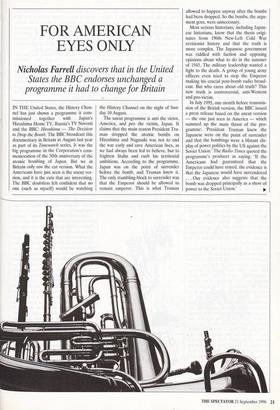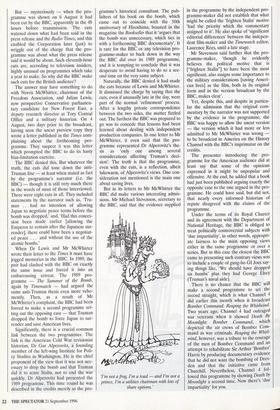FOR AMERICAN EYES ONLY
Nicholas Farrell discovers that in the United States the BBC endorses unchanged a programme it had to change for Britain
the History Channel on the night of Sun- day 10 August.
The uncut programme is anti the victor, America, and pro the victim, Japan. It claims that the main reason President Tru- man dropped the atomic bombs on Hiroshima and Nagasaki was not to end the war early and save American lives, as we had always been led to believe, but to frighten Stalin and curb his territorial ambitions. According to the programme, Japan was on the point of surrender before the bomb, and Truman knew it. The only stumbling-block to surrender was that the Emperor should be allowed to remain emperor. This is what Truman
allowed to happen anyway after the bombs had been dropped. So the bombs, the argu- ment goes, were unnecessary.
Most serious historians, including Japan- ese historians, know that the thesis origi- nates from 1960s New-Left Cold War revisionist history and that the truth is more complex. The Japanese government was riddled with faction and opposing opinions about what to do in the summer of 1945. The military leadership wanted a fight to the death. A grdup of young army officers even tried to stop the Emperor making his crucial post-bomb radio broad- cast. But who cares about old truth? This new truth is controversial, anti-Western and pro-victim.
In July 1995, one month before transmis- sion of the British version, the BBC issued a press release based on the uncut version — the one just seen in America — which summed up the main thrust of the pro- gramme: 'President Truman knew the Japanese were on the point of surrender and that the bombings were a blatant dis- play of power politics by the US against the Soviet Union.' The Radio Times quoted the programme's producer as saying: 'If the Americans had guaranteed that the Emperor could have stayed, the evidence is that the Japanese would have surrendered
Our evidence also suggests that the bomb was dropped principally as a show of power to the Soviet Union.' 11.
But — mysteriously — when the pro- gramme was shown on 6 August it had been cut by the BBC, apparently in the 48 hours before transmission. The cuts watered down what had been said in the press release and the Radio Times, and this enabled the Corporation later (just) to wriggle out of the charge that the pro- gramme was about what the press release said it would be about. Such eleventh-hour cuts are, according to television insiders, highly unusual on programmes which take a year to make. So why did the BBC make such cuts for the British audience?
The answer may have something to do with Norris McWhirter, chairman of the Freedom Association, and Julian Lewis, now prospective Conservative parliamen- tary candidate for New Forest East, a deputy research director at Tory Central Office and a military historian. On 4 August, two days prior to the broadcast, having seen the uncut preview copy they wrote a letter published in the Times com- plaining about the forthcoming pro- gramme. They suspect it was this letter which prompted the BBC to do its hasty bias-limitation exercise.
The BBC denied this. But whatever the truth, the cuts did tone down the anti- Truman line — at least when stated as fact by the programme's narrator (i.e. the BBC) — though it is still very much there in the words of most of those interviewed. There were eight cuts in all. They included statements by the narrator such as, 'Tru- man ... had no intention of allowing Japan to negotiate peace terms before the bomb was dropped,' and, Had this conces- sion been made earlier [allowing the Emperor to remain after the Japanese sur- render], there could have been a negotiat-
ed peace and without the use of the atomic bombs.'
When Dr Lewis and Mr McWhirter wrote their letter to the Times it must have jogged memories in the BBC. In 1989, the pair had clashed with the BBC on exactly the same issue and forced it into an embarrassing retreat. The 1989 pro- gramme — The Summer of the Bomb, again by Timewatch — had argued the same anti-Truman thesis even more vehe- mently. Then, as a result of Mr McWhirter's complaint, the BBC had been forced to make a second programme set- ting out the opposing case — that Truman dropped the bomb to force Japan to sur- render and save American lives.
Significantly, there is a crucial common link between the two programmes. The link is the American Cold War revisionist historian, Dr Gar Alperovitz, a founding member of the left-wing Institute for Poli- cy Studies in Washington. He is the chief proponent of the view that it was not nec- essary to drop the bomb and that Truman did it to scare Stalin, not to end the war quickly. Dr Alperovitz had presented the 1989 programme. This time round he was described in the credits merely as the pro- gramme's historical consultant. The pub- lishers of his book on the bomb, which came out to coincide with the 50th anniversary of Hiroshima, boasted in the magazine the Bookseller that it 'argues that the bomb was unnecessary, which ties in with a forthcoming BBC documentary'. It is rare for the BBC or any television pro- gramme-maker to back down in the way the BBC did over its 1989 programme, and it is tempting to conclude that it was desperate to avoid having to do so a sec- ond time on the very same subject.
Naturally, the BBC denied it had made the cuts because of Lewis and McWhirter. It dismissed the charge by saying that the cuts, even if unusually late in the day, were part of the normal 'refinement' process. After a lengthy private correspondence between the two sides, the matter fizzled out. The furthest the BBC was prepared to go was to concede that lessons had been learned about dealing with independent production companies. In one letter to Mr McWhirter, it even said that the pro- gramme represented Dr Alperovitz's the- sis as 'only one among several considerations affecting Truman's deci- sion'. The truth is that the programme, even with the cuts, is a reflection, albeit lukewarm, of Alperovitz's views. One con- sideration not mentioned is the main one about saving lives.
But in its letters to Mr McWhirter the BBC did make various interesting admis- sions. Mr Michael Stevenson, secretary to the BBC, said that the evidence supplied
'I'm not a frog, I'm a toad — and I'm not a prince, I'm a utilities chairman with lots of share options.'
in the programme by the independent pro- gramme-maker did not establish that what might be called the 'frighten Stalin' motive 'had the priority which the commentary assigned to it'. He also spoke of 'significant editorial differences' between the indepen- dent film-maker and the Timewatch editor, Laurence Rees, until a late stage.
Mr Stevenson said further that the pro- gramme-maker, 'though he evidently believes the political motive that is ["frighten Stalin"] to have been the most significant, also assigns some importance to the military considerations [saving Ameri- can lives] as the film, both in its original form and in the version broadcast by the BBC, makes clear'.
Yet, despite this, and despite in particu- lar the admission that the original com- mentary by the narrator was not supported by the evidence in the programme, the BBC was happy to allow the uncut version — the version which it had more or less admitted to Mr McWhirter was wrong to be broadcast in America on the History Channel with the BBC's imprimatur on the credits.
The presenter introducing the pro- gramme for the American audience did at least say that some of the opinions expressed in it might be unpopular and offensive. At the end, he added that a book had just been published arguing exactly the opposite case to the one argued in the pro- gramme. He could have said, but did not, that nearly every informed historian of repute disagreed with the claims of the programme.
Under the terms of its Royal Charter and its agreement with the Department of National Heritage, the BBC is obliged to treat politically controversial subjects with 'due impartiality', in other words, appropri- ate fairness to the main opposing views either in the same programme or over a series. But in this case the closest the BBC came to presenting such contrary views was to include a couple of gung-ho GI Joes say- ing things like, 'We should have dropped six bombs' plus they had George Elsey (Truman's naval aide). There is no chance that the BBC will make a second programme to set the record straight, which is what Channel 4 did earlier this month when it broadcast Bomber Command: Reaping the Whirlwind. Two years ago, Channel 4 had outraged war veterans when it showed Death By Moonlight: Bomber Command, which depicted the air crews of Bomber Com- mand as war criminals. Reaping the Whirl- wind, however, was a tribute to the courage of the men of Bomber Command and an attempt to rehabilitate Sir Arthur 'Bomber' Harris by producing documentary evidence that he did not want the bombing of Dres- den and that the initiative came from Churchill. Nevertheless, Channel 4 fol- lowed this programme by showing Death by Moonlight a second time. Now there's 'due impartiality' for you.



















































































 Previous page
Previous page